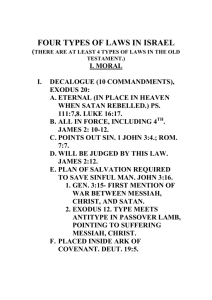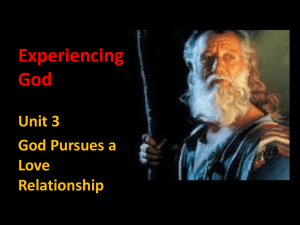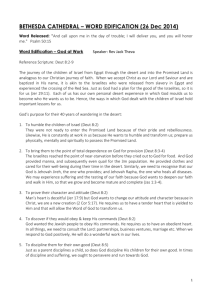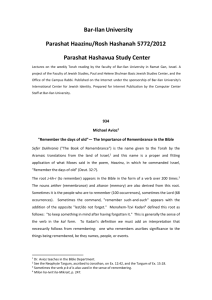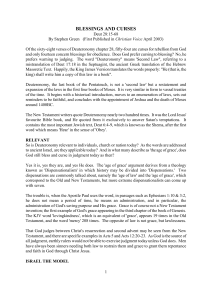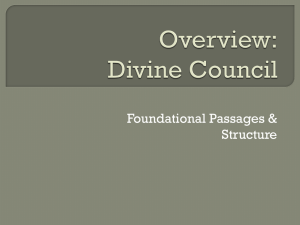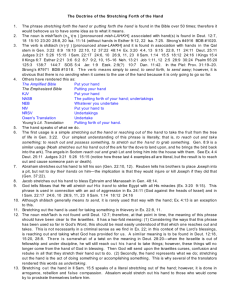Slide 1 - Church Leadership Resources
advertisement
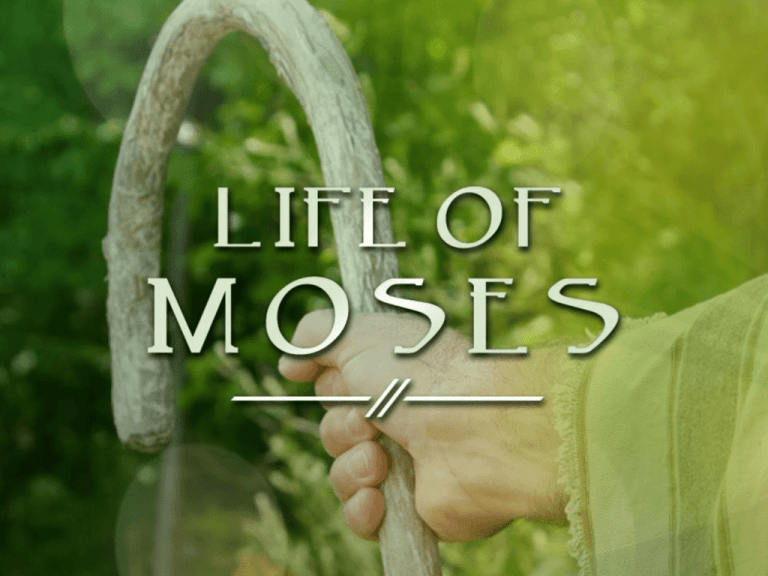
Moses and the New Generation I. What were some of the ways the new generation was prepared for conquest of the land? A. There was a new numbering of the people (Num. 26). Before we can transition into our future, we must take a personal inventory and see where we actually stand. B. There was a review of their history (Deut. 1:9-3:29). Before we can transition into our future, we must have a true understanding of the past and how we got to this point. C. There was a renewed challenge of obedience (Deut. 4:1-40). Before we can transition into our future, we must renew our commitment to the Lord and realize that all success will be based on doing things God’s way and walking in His love. D. There was a rehearsal of the Ten Commandments (Deut. 5:1-33). Before we can transition into our future, we must establish our boundaries and determine to function within the confines of God’s law. E. There was a challenge to pass these precepts on to the next generation (Deut. 6:1-25). Before we can transition into our future, we must develop a strategy that makes provision for our vision to outlive us and to incorporate the next generation into what we are doing in the present. F. There were warnings about intermarrying and maintaining their separation from the other nations (Deut. 7:1-26). Before we can transition into our future, we must realize that our strength as believers is in our separation from anything that is unclean. G. There was a challenge not to forget the miracles that God had done for them (Deut. 8:1-20). Before we can transition into our future, we must acknowledge that without God’s supernatural intervention we cannot take the steps needed to possess our future. H. There was a reminder as to why God was allowing them to dispossess another people and enter the Promised Land (Deut. 9:1-29). Before we can transition into our future, we must make sure that we understand why God’s hand is upon us so that we do not presume to walk away from the Lord. I. There was an admonition to love the Lord always from the heart (Deut. 10:1211:1). Before we can transition into our future, we must make sure that our priorities are right, keeping God as first and foremost in all that we do. J. There were promises given to those who served the Lord in the land (Deut. 11). Before we can transition into our future, we must cling to the promises that God has given to us personally and prophetically. K. There was the development of cities of refuge (Num. 35:1-15; Deut. 4:41-43; 19:1-13). Before we can transition into our future, we must understand that there is a place of refuge in God when we seem to be overwhelmed. L. There were instructions regarding conquest (Deut. 20:1-20) Before we can transition into our future, we must realize that if we are walking in the will of God, God will fight for us and we can go forward with focus and boldness. II. What were the keys to their keeping God’s favor and their possession of the Promised Land? A. The keeping of their land inheritance had certain conditions (Deut. 28:9). 1. The Israelites could inherit blessings on every side and remain in the land through obedience (Deut. 28:1-14). These blessings included the following: a. They would be blessed in both the city and the country, wherever they chose to live. b. They would be blessed in all that they produced including offspring, crops and herds. c. They would be blessed with continual and abundant provision. d. They would be blessed in their travel and moving about. e. They would be blessed with victory over all those who would oppose them. f. They would be blessed in every business transaction and every endeavor. g. They would be blessed with weather patterns that brought life to the land. h. They would be blessed with surplus to become lenders and not borrowers. i. They would be blessed by being in a position above and not beneath. j. They would be both the envy and the dread of every other nation. 2. The Israelites could inherit curses on every side and be expelled from the land through disobedience (Deut. 28:15-68). These curses included the following: a. The opposite of all of the above. They would be cursed in all of the areas where they had been blessed. b. They would experience cursing, confusion and rebuke in all that they set their hands to do until they perished quickly (Deut. 28:20). c. They would build houses but not live in them. d. They would plant vineyards but not reap the produce. e. Their animals will be stolen from them. f. Their crops will be destroyed by mildew, locust and worms. g. Their land would be turned to dust. h. They would have extraordinary plagues and serious and prolonged sickness cling to them (fever, consumption, inflammation, tumors, boils, blindness, the scab and the itch). i. They would experience mental and emotional problems (madness, confusion). j. Their carcasses would be devoured by wild beasts. k. They would experience domestic problems. l. They would experience financial problems and become debtors to many. m. They would experience closed heavens over their life. n. They would be plundered and oppressed continually by other nations. o. They would be put to flight by their enemies. p. They would be dispossessed of the land and taken into captivity. q. Their children will go into slavery to other nations. r. They would become a sore spot for all of the nations of the earth. s. They would experience hunger, thirst and nakedness. t. They would be enslaved and killed by other nations. u. They would be scattered among the other nations and lose their national identity. v. They would find no peace or rest but will have a trembling heart, anguish of soul, fear day and night and no assurance of life. w. They would become an astonishment, a proverb, a byword, a sign and a wonder among the nations as a testimony of what it means to abandon the Lord (Deut. 28:37, 45-46). B. The Israelites could be restored through repentance and returning to the Lord (Deut. 30:1-10).

